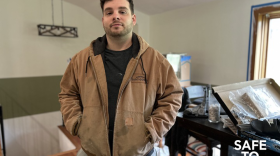The state has confirmed unsafe levels of PFAS chemical contamination at a town park and former industrial site in Merrimack.
This comes nearly a year after the site's owner first reported finding the toxins in groundwater at the former chemical plant and tannery.
State officials confirmed the contamination and disclosed it to property owners near Watson Park in letters sent in August.
The letters say not to be alarmed, but the park's groundwater was found to contain 88 parts per trillion of PFOA. That's a PFAS-type chemical that's been linked to cancer, as well as kidney, liver, thyroid and cholesterol problems.
The current state limit on PFOA in groundwater is 70 parts per trillion. Meanwhile, the Centers for Disease Control says PFOA may carry health risks at exposures of just 11 parts per trillion.
Watson Park is down the road from Merrimack’s Saint Gobain plastics factory, which is thought to have tainted hundreds of nearby public and private wells with PFAS two years ago.
The state’s letters advised residents near the park on where to get further water testing, and said they're continuing to study the site and how contamination may spread.
The town of Merrimack also plans to hold a public meeting soon on ongoing local PFAS issues.








